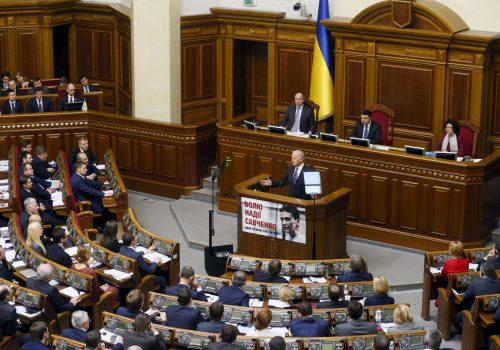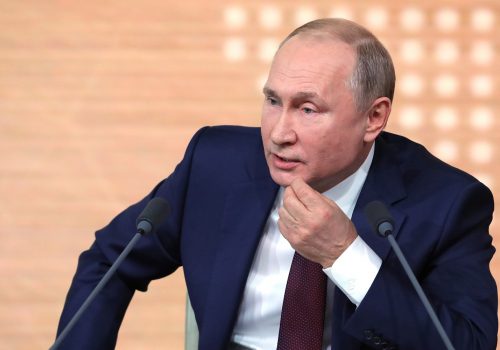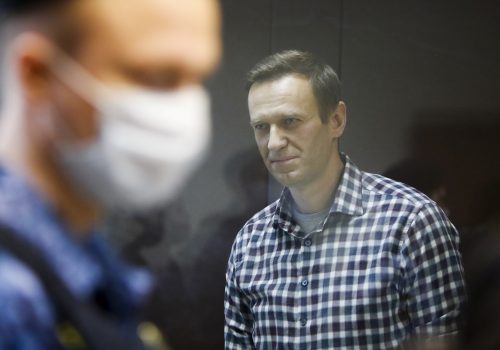FAST THINKING: Russia’s making military moves in Ukraine. What’s it up to?
JUST IN
Russia is massing military forces on its border with Ukraine and in Crimea, sparking fears of renewed aggression and leading to US President Joe Biden’s first direct phone call with Ukrainian President Volodymyr Zelenskyy. Moscow is even warning NATO to not deploy troops should the conflict escalate. Seven years after Russia first invaded Ukraine and annexed Crimea, how did we get to this new point of peril? And what should we expect next? We checked in with our Eurasia Center, which is tracking the situation closely.
TODAY’S EXPERT REACTION COURTESY OF
- Melinda Haring (@melindaharing): Deputy director of the Eurasia Center
- Alexander Vershbow (@ARVershbow): Distinguished fellow, former US ambassador to Russia, and former deputy secretary general of NATO
- John Herbst (@JohnEdHerbst): Director of the Eurasia Center and former US ambassador to Ukraine
How we got here
- Melinda reminds us that this new point of peril isn’t so new: “Russian-controlled forces have occupied 7 percent of Ukraine ever since” the 2014 annexation of Crimea and invasion of the Donbas region of eastern Ukraine, “while the world mostly shrugged and moved on. By controlling a sizable chunk of eastern Ukraine, Russian President Vladimir Putin can turn up the intensity whenever he likes.”
- And now is apparently one of those times, she adds: “In recent days, Moscow has moved more weapons and troops around, ramped up hostilities, and let loose a volley of nasty threats.”
What to make of Moscow’s moves
- “The Russians may only be testing the reaction” of the new Biden administration, Alexander says, “but the possibility of a new land grab cannot be ruled out.”
- The recent case of Nagorno-Karabakh could be instructive here, he adds: After Russia’s success in sending peacekeepers to the disputed region “following Azerbaijan’s victory over Armenia last November, Russia may be laying the ground for the overt deployment of ‘peacekeepers’ in Donbas rather than the seizure of additional territory. The purported mission would be to protect Russian citizens in the occupied territories (who are actually Ukrainian citizens ‘passportized’ since Zelenskyy’s election in 2019).”
- John tells us that Russia’s military buildup has been accompanied by allegations from Russian officials that the Ukrainian government is planning aggressive acts and chatter in “state-friendly” Russian media about “the need to annex territory in eastern Ukraine.”
- The provocative statements from Russia are “more likely bluff than prelude to further aggression,” he says, but the US government “cannot take this for granted.”
What the US can do
- There is some encouraging news, John notes: The Biden administration has recognized these alarming developments and “conducted an extraordinary number of calls this week to demonstrate support for Ukraine in the face of Kremlin intimidation”—not just Biden’s conversation with Zelenskyy, but also calls between the US national security advisor and the chief of staff to the Ukrainian president, the US secretary of state and the Ukrainian foreign minister, and the US secretary of defense and the Ukrainian defense minister. “To make sure Moscow gets it,” the chairman of the US Joint Chiefs of Staff called both his Ukrainian and Russian counterparts, he adds.
- While “this phone diplomacy has given Moscow reason not to strike,” John thinks the Biden administration should take at least one more step by conveying to the Kremlin either privately or publicly that if it makes a move in Ukraine “to the water canal north of Crimea or to Mariupol, or to introduce ‘peacekeepers’ into occupied Donbas, the US will sanction [the Russian state bank] Vnesheconombank and perhaps a second Russian bank. This will give Putin further pause before escalating his current war on Ukraine.”
- Melinda agrees that the Biden administration can’t stop at phone diplomacy: “Washington needs to tell Moscow that if it doesn’t leave the Donbas in six months, the United States will levy more sanctions and begin visa bans on top Russian officials and their children.” She also advises the US government to appoint a senior director for Russia at the National Security Council—stat!—and to insist that the United States be part of any high-level negotiations to resolve the conflict in eastern Ukraine.
Further reading
Fri, Mar 5, 2021
Biden and Ukraine: A strategy for the new administration
Issue Brief By
The United States has been an essential partner for Ukraine since the Kremlin's invasion in 2014. Now that Joe Biden has taken office, he has a real chance to move past the difficult detour that US-Ukraine relations took under his predecessor.
Fri, Feb 26, 2021
How to deploy economic tools against Putin’s aggression
New Atlanticist By Brian O’Toole, Daniel Fried
Life doesn’t wait for any administration—and neither will Putin. Here's how the US government can deploy sanctions and other tools of economic statecraft as part of a broader Russia policy.
Tue, Mar 2, 2021
Three big takeaways from Biden’s first Russia sanctions
New Atlanticist By Brian O’Toole, Daniel Fried
After weeks of speculation, we now know how the Biden administration will sanction Russia in direct response to the poisoning, sentencing, and detention of Russian opposition leader Alexei Navalny.
Image: Ukraine's President Volodymyr Zelensky speaks during a joint news conference with U.S. Secretary of State in Kiev, Ukraine January 31, 2020. REUTERS/Kevin Lamarque/Pool


